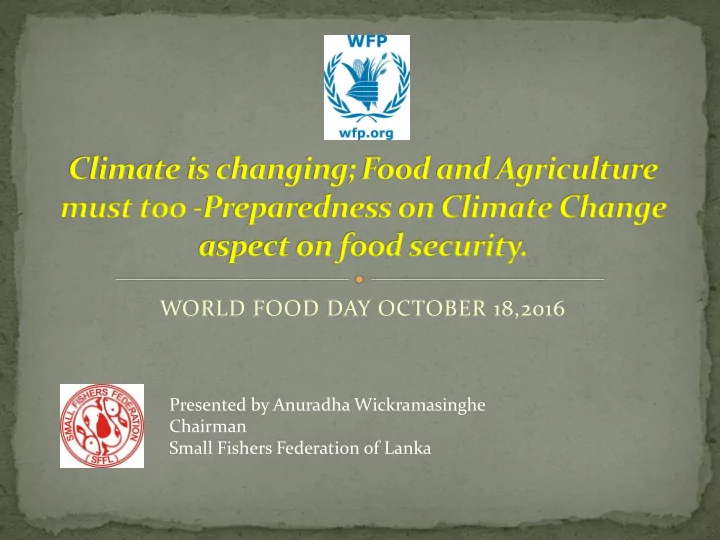

WORLD FOOD DAY OCTOBER 18,2016 Presented by Anuradha Wickramasinghe Chairman Small Fishers Federation of Lanka
During the 12 centaury AD in Polonnaruwa era in Sri Lanka, the great king Prakkaramabahu, send the food carriages to each and every villages and the houses throughout the country to share with the families or persons who suffering on lack of food. But no any single family or persons applied, they have rejected. Because of everybody in the country had what they want to eat and also surplus of the food.
Another, Very classical evidence indicated in Thonigala inscription in 4th century AD .That was in the dry zone farmers of the country had three cultivation seasons in each year. The Thonigala inscription said as first season, second season and thirds season- According to inscription language- pitadhdagas, akalahas, medahasa.
Thonigala inscription further reviled that ancient communities practiced food banking system. If someone needs paddy or any seeds to barrow, they had to pay the interest as one and quarter or one and half, per season based on the amount that they have borrowed. This evidence indicated that how Food security and banking had a very common relation in our history.
Another important factor is sharing of water for the cultivation. Right amount of water, at right time to right place. For food security and better harvest the ancient Sri Lankan practiced many rituals. First one was flowing together by obtaining water at right time for all, secondly planting together, then weeding together and harvesting together then finally the equal sharing. All these activities organized at auspices time and these rituals appropriately balancing the nature and its natural services.
Historical evidence through inscriptions of Sri Lanka , we can learn that no one allow to kill fish brooders. When community engaged in harvesting inland fish, lagoon fish or sea fish they have shared based on their labor. When they caught shrimp or crabs brooders, they are throwing to lagoon or sea without killing. Food security concept always planted in community mind.
And also Historical evidence indicates that food security in ancient era still very appropriate to practice at present days . Now I would very much be pleased to present my experience with World Food Programme and the Small Fishers Federation of Sri Lanka. Last year we have established our connection with WFP because we are directly working with less resilience fishing communities throughout the country.
We have initiated several programmes on poverty alleviation and empowerment of fishermen and women to make decision on their own development. Our studies indicated during last 20 year, due to cutting down of mangroves in the lagoon system, fish catch per unit effort has been dropped from 12kg to 5 kg. And also our studies indicated that one he of mangroves absorbed the carbon of 2million liters of diesel. Mangroves directly connected with climate change by absorbing atmosphere carbon. Small Fishers Federation has initiated mangrove conservation programme with the community. We are working throughout the coastal belt focusing shallow waters of the sea and 48 major lagoon systems in 14 coastal districts in the Country. All these 14 coastal districts are very Rich on mangrove ecosystem and mainly focused to protect mangrove associated coastal environment. We are working with smaller fishing community who protecting the mangroves to maintain sustainable livelihood and balancing the climate change.
One day when I walked with my staff at Vidathaltheevu lagoon shore I observed that one of mother is walking with her preschool age child and suddenly, mother was bent down and picked up a mangrove seedling floating on the water and planted in lagoon bank. The child immediately asked from mother why you have done that Mami. She replied. Son, do you know that our fish coming from mangroves. We are living, because of the mangroves and therefore we have to protect and plant mangroves. Son has shaked the head and walked with the mother.
I was wondered. This was the great message for me to approach WFP to implement “Building Community resilience for climate change induces Mangrove conservation programme in Vidathaltheevu. Under this programme, last one year period ,we have planted over 60000 seedlings of mangroves in Vidathaltheevu lagoon with the community. In addition, have set up a Mangrove nursery to provide more mangrove plants. Women based community organizations also set up around Vidathaltheevu lagoon and trained the livelihood skills over 253 women and provided micro loan to commence profitable livelihoods. Now they are gradually building their economy and also directly involved in Mangrove conservation of Vidathaltheevu lagoon.
provided micro loan to commence profitable livelihoods. Now they are gradually building their economy and also directly involved in Mangrove conservation of Vidathaltheevu lagoon.
WFP initiation of Community resilience on climate change and induces mangrove conservation is one of the great experience and lesion learnt to introduce Northern Province. This effort is directly related with food security and climate change. In ancient period we have engaged in resource conservation. Dry zone need water, in our history upcountry forest cover conserved without destroying. People need protein through fish and therefore no damaged to mangroves and preserved fish breeding ground. Banking system introduced to community as a tool for poverty alleviation through minimum interest rate. Thonigala Inscription provide evidence. All aspects are inter connected .My understanding is WFP is based on historical wisdom of climate change and community resilience building.
She is a mother .Her hands make new era to the country. She knows how valuable mangroves on their livelihood and climate change. Service personnel supported her to replant mangroves on her life property of Vidathaltheevu lagoon L i f e g i v i n g e t e r n a l m a n g r o v e s
Recommend
More recommend